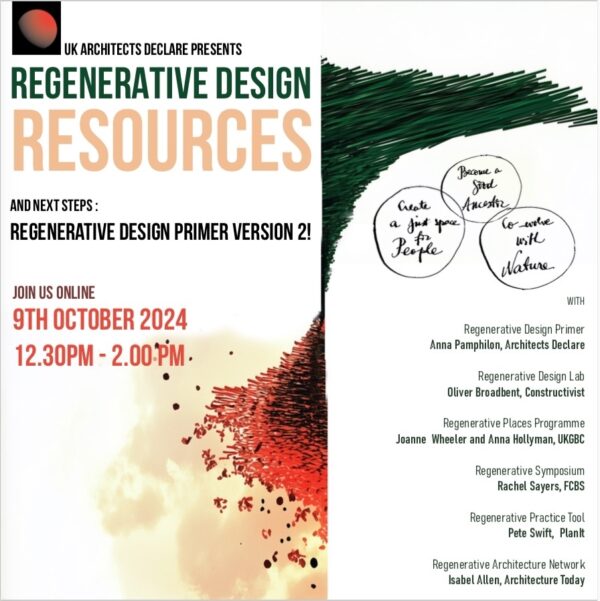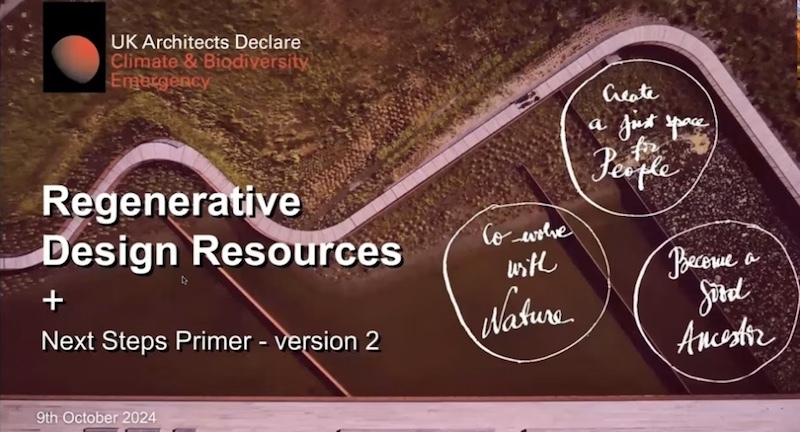News
For latest updates on UK Architects Declare, please also follow us on BlueSky, Instagram and LinkedIn
Architects Declare invites Next-Gen Ambassadors to help shape our work
In September 2024, UK Architects Declare invited our first volunteer student ambassadors - Amy Thompson and Anushka Gupta - to join us, providing the perspectives of architectural students. It felt particularly important, as we marked five years since we launched in 2019, that we ensure our next phase of work is informed by and remains relevant to a wide range of current and emerging thought on architecture’s place in tackling the planetary emergency. You can read Amy and Anushka's reflections on their year with AD as our Student Ambassadors here.
We now wish to build on this by reframing the role to represent more broadly, and in depth, the next generation of built environment professionals, whether studying, on placement or in practice. We are therefore inviting emerging members of the profession to volunteer as Next-Gen Ambassadors.
We seek Next-Gen ambassadors for 2025/26 who can draw on their learning in academia and in practice to help shape our thinking, how we engage with different audiences, who we collaborate with, what support we offer signatories, and where we can best intervene to change the systems that perpetuate a degenerative built environment to ones that promote regenerative policies and actions.
Our Next-Gen Ambassadors group will review and build on the Theory of Change that Amy and Anushka have developed with other members of our Steering Group and define what their involvement will include.
More than a voice in the Steering Group, this new group will help us to:
Align our 12-point Declaration and 3 Regenerative Architecture principles towards academia;
Connect students and practitioners to new thinking and develop new learning pathways;
Encourage a fresh perspective in the profession towards creating a positive future for next generations;
Create young architects activated with regenerative knowledge and the agency to make change;
Build networks, organise events, create publications and generate any other initiatives the Next-Gen ambassadors might suggest.
The full Next-Gen Ambassadors role description role, along with the process to respond to this invitation, is here.
Deadline for application: 4th August.
10 July 2025
Architects Declare thanks our Student Ambassadors for their year of commitment and support
In September 2024, UK Architects Declare invited our first volunteer student ambassadors - Amy Thompson and Anushka Gupta - to join us and provide the perspectives of architectural students. This felt particularly significant as we marked our first five years and wanted to ensure our next phase of work is informed by and remains relevant to a wide range of current and emerging thought on architecture’s place in tackling the planetary emergency.
Amy and Anushka have spent their year as Student Ambassadors defining the role and its development, making connections with academics in regenerative education, and helping to shape our events and guidance. They have made a tremendous contribution to Architects Declare over the year since we created this new volunteer role.
Here, Amy and Anushka offer their personal reflections on the year that's now coming to a close - and what is ahead.

Amy Thompson: "Over the past year, the Student Ambassador role has been an enjoyable and eye-opening experience that has opened doors to a network of likeminded individuals (students, practitioners, and educators) united by a shared urgency to do more in the face of the climate crisis. Working with Anushka, these interactions have sparked both challenging and inspiring conversations that helped us explore not just what this role could be, but what it could do.
"I believe that as this ambassadorship evolves, it has the potential to become a powerful tool for change, elevating young voices and fostering two-way learning between future architects and those already shaping the profession. What began as a question of impact has grown into a vision that I am excited to help the next generation of ambassadors build on.
"On a personal note, this opportunity with UK Architects Declare has allowed me to attend events that broadened my knowledge, deepened my involvement in regenerative design, and strengthened my connection to climate-focused thinking. My passion for regenerative design has not only enriched my academic work at the University of Bath, it has also been shaped by it, each feeding the other.
"As the next cohort make the role their own, my hope is that it becomes a true launchpad for Next-Gen voices; shaping the future of both education and practice in architecture."

Anushka Gupta: "When Amy and I first met, we had many discussions about architectural education, navigating the impact we could have in the role, what might the role be, or even just getting a grasp on what Architects Declare was doing. Now with the Theory of Change, we have solidified all those discussions into a clear direction the new Next-Gen ambassadors could take.
"Before I joined Architects Declare, my thinking was firmly shaped by Doughnut Economics, and acronyms like RAI flew over my head in the meetings. Now, I tell everyone everywhere I go about AD! To understand AD better, I embedded the themes of Create a Just Space for People, Co-evolve with Nature and Be a Good Ancestor into my university project to test regenerative design principles. I even read Flourish, and started reading Donella Meadows to get a better grasp on systems thinking, which is a language I am much more fluent in. Despite not knowing much about being a good ancestor, organising events to do with the theme helped me constantly reflect on the topic, and learn through organising. To anyone interested in the role: you don't need to be an expert! In fact, it was being part of AD that helped create a solid foundation of my understanding of Regenerative Design.
"Although it seems like my time at Architects Declare has come to an end, in some ways, it feels like it has only just begun. The end of organising events meant meeting the team in person, which made my connections to the Steering Group members much more real and genuine. The Steering Group are a really kind, encouraging group of people. If you are passionate about making things happen, I'm sure you will flourish here!"
A particularly important outcome of Amy & Anushka’s time with us is that we now wish to build on their success by reframing the role to represent more widely the next generation of built environment professionals, whether studying, on placement or in practice. We are therefore inviting emerging members of the profession to volunteer as Next-Gen Ambassadors. See our parallel news story: Architects Declare invites Next-Gen Ambassadors to help shape our work.
10 July 2025
The 2025 Regenerative Architecture Index - Open for Your Entries!
Last year, 68 organisations entered our inaugural Regenerative Architecture Index, showcasing a wealth of practices and projects that exemplify the transition to regenerative built environment solutions for local and planetary health. The 2025 Index is open for your entries until 16th May - but start work early with colleagues across your practice to shape your responses!

Launched by Architecture Today and UK Architects Declare, the RAI benchmarks progress in the move towards regenerative approaches for a built environment that isn’t merely reducing its negative impacts, but has positive impacts for today and the long term.
If you took part in last year’s RAI, you can view and update your previous answers - follow the same link above for details.
And if you are looking for inspiration, you can view highlights from last year's entries in the special issue of Architecture Today from September - and join AD and Architecture Today for our RAI exhibition stand and our discussion event at this year's Futurebuild in London.
3 February 2025
AD & ACAN joint statement on proposed demolition of the Centenary Building
When the Architects' Journal first published news of plans to demolish the University of Salford Cententary Building, AD and ACAN agreed a joint statement in support of efforts by The Twentieth Century Society to preserve what was the first building to win the UK's Stirling Prize, in 1996. That has been included today in a follow-on AJ article - Environmental campaigners join bid to save Hodder’s Centenary Building. The AJ launched its RetroFirst Campaign in 2019.
As well as The Twentieth Century Society, the article also quotes Don’t Waste Buildings, a voluntary group calling on the government to make re-use of existing buildings simpler and more profitable.
The AD & ACAN statement reads in full:
"We fully support the Twentieth Century Society’s bid to preserve Hodder Associates’ Centenary Building - the pioneering structure that was the first to win the prestigious RIBA Stirling Prize.
"This highlights the question ‘How is a building that won the Stirling Prize being considered for demolition in less than 30 years?’ We should be creating structures that endure for centuries and stand the test of time, not just a mere fashion statement of the decade! Could the Stirling Prize evolve to become a benchmark for buildings that are designed to serve multiple generations, demonstrate adaptability for re-use, and withstand the challenges of climate change?
"If we are to reduce carbon emissions to the extent necessary to avoid catastrophic climate breakdown and biodiversity loss, upgrading existing buildings, as opposed to building new, must now become the default. Prioritising retrofit over new build is going to mean a change in ‘business as usual’; refurbishments often don’t yield the same profit levels as new builds, and in a volatile economy this is not easy but certainly necessary. Architects Declare advocate for VAT reform in their Building Blocks manifesto to ensure retrofit is not penalised with higher VAT costs than new build.
"We call upon the industry to stand united in pushing for necessary system change and to celebrate the creativity that can come with retrofit."
25 November 2024
AD's Student Ambassadors reflect on COP29's opening today
As the COP29 climate change conference opens today, our two recently appointed Student Ambassadors share the following on behalf of AD's Steering Group:
The Conference of the Parties (COP) annual meeting of the UNFCCC has historically been a vehicle for significant change. As we crafted this COP statement, we both reflected on growing up alongside the rise of climate activism. Seeing Greta Thunberg - a member of our own generation - ignite a global movement and bring climate discussions to every household was pivotal in shaping our awareness of climate justice. Through the School Climate Strike Movement, she applied pressure not only on governments but also mobilised people worldwide to consider their environmental impact. She became a household name and so did COP.
Meanwhile, it was from a UN International Panel on Climate Change special report that discussions leading to the founding of UK Architects Declare began, marking the beginning of a collective recognition within the built environment of the urgent need for change.
As these movements surpass their fifth anniversaries, the first global stocktake took place at COP28 to assess collective progress. The findings show that:
- The current efforts are still insufficient to meet the long-term goals of the Paris Agreement, and implementation of commitments needs to be accelerated and scaled up
- There is an urgent need for a transition away from fossil fuels- notably, not a complete phase out of fossil fuels
- Current adaptation measures are not keeping pace with rising risks
- Increased, equitable, financial support is necessary to implement climate actions effectively
The recent UN Emissions Gap Report also highlights the urgency of the situation, illustrating that our current approach places us on a trajectory toward a 3°C rise - a temperature our Earth cannot tolerate.
Reflecting on the last five years, we feel that the upsurge in climate action in 2019 was unsustained. We feel let down that the actions and commitments since still fell short of delivering the transformational change we should have witnessed.
We need to look beyond a reductionist approach and strive for the regeneration of our natural systems.
As we approach COP29, we urge our government to lead by example and champion discussions aimed at bold, transformative change. By signing the Declaration de Chaillot following COP28, the UK government has reaffirmed its commitment to climate resilience within the built environment. Given the built environment's significant contribution to UK emissions, it has the potential to set a powerful precedent for other sectors on the path to a sustainable future. The UK government now has a unique opportunity to inspire global action by creating a truly regenerative built environment.
While policies addressing housing and energy are in place, we draw attention to AD's Building Blocks - a manifesto for comprehensive, holistic action aimed at a regenerative approach to the built environment. Adopting the Building Blocks framework would allow the UK government to catalyse a ripple effect, inspiring other sectors, countries, and the global community to adopt innovative changes necessary to restore our climate.
We want to see the implementation of innovative national policy, informed by light-footed student and industry-led organising, to ignite lagging global action at COP29.
- Anushka Gupta and Amy Thompson, UK Architects Declare Student Ambassadors
11 November 2024
AD response to Rachel Reeves' Autumn Budget
The Autumn Budget was announced on the day that parts of Spain received one year's worth of rainfall in eight devastating hours, causing more than 217 deaths and millions in damages. Against this backdrop, the Chancellor's Autumn Budget lacks the vision and urgency needed to advance a just transition, protect public health and address the government’s priorities for climate and nature.
There are some welcome investments. Notably the 25% budget rise over the next five years for the Department for Energy Security and Net Zero; a crucial £200 million per year for tree planting and peatland restoration; a tax hike for private jets and commitment to fund important rail projects like the TransPennine Route Upgrade and East West Rail.
However, the 50% increase in the bus fare cap, and above inflation rise in rail fares continues the long-term trend of rising public transport costs, disincentivising low-carbon travel options. The failure to lift the thirteen year freeze on fuel duty and decision to keep the 5p cut made by Conservatives in 2022, also sends the wrong message about the future of travel. Not least because this tax relief is estimated to have raised UK greenhouse gas emissions by 7% since 2010.
The government has committed £1 billion of funding over three years for the Public Sector Decarbonisation Scheme, and £3.4 billion for the Warm Homes Plan between the financial years 2024-25 and 2027-28. This is significantly lower than their manifesto pledge of £13.2 billion between 2024 and 2029, and insufficient to address the 27 million UK homes that require retrofitting in order to meet 2050 net zero commitments.
Our Open Letter to the Chancellor on 13th September pointed out the ways in which the budget could have been ambitious in its approach to tax arrangements to address the climate crisis. We also feel that this would have been a chance to align with our Building Blocks policies and commit to investment in a full circular economy transition, but is a disappointing missed opportunity.
The Autumn Budget was an opportunity for the government to show that addressing the climate and biodiversity emergencies are central to a thriving nation and a successful economy. The piecemeal and unambitious spending announcements fail to reflect the urgency and gravity of the crisis we face.
7 November 2024
AD response to Scottish Government consultation on a Scottish equivalent to the Passivhaus standard
Last month, UK Architects Declare responded to the Scottish Government's consultation: Building Regulations: Determining the principles for a Scottish equivalent to the Passivhaus standard: Stage 1 consultation.
Whilst we are encouraged to see ambitious new legislation being put forward, our response supports the Passivhaus Trust's position that following the Passivhaus methodology offers a documented approach that is effective at reducing the performance gap between performance in design and operation, and we would be disappointed to see this approach watered down at such a critical time in history when rapid emissions reduction is essential.
We encourage the Scottish Government to set a heating demand limit. This legislation has the opportunity to tackle environmental issues at the same time as addressing pressing socio-economic issues such as fuel poverty. We would also welcome standards that consider both regulated and unregulated energy to ensure the full scope of energy use is being considered and are aligned with the objectives of the UK Net Zero Carbon Building Standard, the pilot version of which was released in September.
Whilst this new legislation is a step in the right direction, Architects Declare would also encourage the Scottish Government to look beyond operational energy, and consider adopting embodied carbon legislation as soon as possible, similar to the "Part Z" proposal (an amendment to The Building Regulations 2010) being advocated for by the construction industry in England and Wales.
7 November 2024

Next steps on AD's Regenerative Design Primer + Signposting other regenerative design resources
Over 100 people joined us for our special online session earlier this month to learn about a range of practical resources on offer to help build the transition to a regenerative built environment with positive, people and planet-friendly actions to turn around the global climate and biodiversity emergency.
Members of the AD group of volunteers working on our Regenerative Design Primer provided a walkthrough of the guide, which we launched earlier this year as initial support alongside the Regenerative Architecture Index we’ve developed with Architecture Today.
Eike Sindlinger set out what regenerative design is and why it is needed.
Kevin Logan explained how AD’s Primer is set out to support this shift in practice.
Anna Pamphilon, who has been leading this work for UK Architects Declare, set out the next steps towards version 2 of the Primer, which we will kick off with a dedicated event on 21st January - details to follow.
As Anna says, “AD sees this work as an iterative and interactive process to support architects and other built environment designers and we encourage any AD signatory practices (and others) who would like to be involved to get in touch.”
Participants had brief introductions to substantial and practical resources that others have brought to the growing debate on a regenerative design paradigm:
Isabel Allen, editor of Architecture Today, spoke about the online Regenerative Architecture Network that’s recently launched as part of the Regenerative Architecture Index initiative.
Oliver Broadbent of Constructivist spoke about their Regenerative Design Lab initiative.
Joanne Wheeler and Anna Hollyman of UK Green Building Council introduced their Regenerative Places Programme.
Rachel Sayers of architects FCBStudios outlined the Regenerative Symposium they held for the sector earlier this year.
Pete Swift of urban and rural place design practice PlanIt talked about their Regenerative Practice Tool.
You can watch all the talks in this video from the event.

And we've created a short summary of the discussions from the Q&A session and Zoom chat, along with all the links to the resources and other sources mentioned in the event.
Speaking after the event, Anna Pamphilon, said: “It was wonderful to see so many signatories at our Regenerative Design Resources event and encouraging to hear about the various actions being taken across our industry in support of a more regenerative built environment. While there is still a long way to go and much more to be done, this is a strong start!”
Pete Swift of Planit said: “Whilst we are not architects, the invitation by AD has been welcome and timely. This is a joint endeavour and to make any impact we have to get out of our disciplines, as much as our silos. In a world where there is no ‘training manual’ to move towards regenerative thinking and design, we are all compiling our own manuals, building on the work of others. I’m excited to share what we are doing here at Planit – it’s ‘open source’ in the very best way.”
And Rachel Sayers of FCBStudios said: “It is great to see such a strong cohort of thinkers, researchers and practitioners contributing to approaches for regenerative design.”
We look forward to working with our speakers and participants at this event - and with many other organisations - as we navigate and accelerate the shift in paradigm away from ‘business as usual’ and beyond ‘sustainability’ to truly regenerative approaches to a built environment aligned with the needs of the planetary emergency.
29 October 2024

Architects Declare appoints two Student Ambassadors
UK Architects Declare is delighted to welcome two brilliant Student Ambassadors - Amy Thompson and Anushka Gupta - to support our Steering Group.
As we mark AD's first five years and plan for our next phase of work, we want to ensure our approach is informed by and remains relevant to a wide range of current and emerging thought on architecture’s place in tackling the planetary emergency. This new role builds on our existing Steering Group members' breadth and depth of experience by ensuring our discussions and plans benefit from the perspectives of students who can draw on their learning and knowledge of student networks to help shape our thinking, how we engage with different audiences and partners, what support we offer signatories, and where we can best intervene to change the systems that perpetuate a degenerative built environment to ones that promote regenerative policies and actions.
As we say in our accompanying LinkedIn post on this development - with links to Amy and Anushka's LinkedIn profiles - there is a lot to be done with regards to building climate literacy around regenerative practices into mainstream architectural education. There have already been some good initiatives, as highlighted in Hattie Hartman's recent Architects’ Journal article (Architectural education is changing. But is it changing fast enough?) but these need scaling up and fast. As Amy and Anushka say in our post:
“Through our term we aim to lay the foundations towards this goal and establish connections that will allow the network to grow, including outcomes which:
- provide a fresh perspective on current climate mitigation solutions
- keep signatories and aspiring architects connected to new thinking
- give agency to the architects of the future as they move into practice; allowing them the skills to create the change that is needed.”
Anushka is a final year undergraduate architecture student at the University of Bath. She has completed internships at NLA and SEA LAB, and has organised large-scale events such as an inter-university student competition and the stuCAN festival as part of Architects Climate Action Network (ACAN).
Amy is currently studying towards her Part 2 qualification at the University of Bath and has a passion for Regenerative Design. She has worked at Feilden Clegg Bradley Studios on the regenerative Eden Dundee Project, and is currently conducting her final year research paper on the topic.
AD Steering Group member Zoe Watson says: “I think what excites me the most about this new role is the fresh perspective and energy Amy and Anushka will bring. As professionals it is easy to get bogged down in the day-to-day client pressures. However, as the climate crisis will affect future generations the most, it seems perhaps more obvious to younger generations that change is the only way forward.”
Amy and Anushka's term runs until June 2025, when we will start planning for next year's Student Ambassador(s) to build on their work with us. This new role is a special addition to support our Steering Group: its existing members work in a range of architectural practices and other built environment organisations around the UK and are also trustees of AD's registered Charitable Incorporated Organisation.
23 October 2024
Architects Declare signs joint statement on Climate Change and Planning
UK Architects Declare has joined with other environmental and built environment organisations in responding to the Government's recent consultation on the National Planning Policy Framework for England (NPPF).
The joint statement - from Alliance for Sustainable Building Products, Bioregional, Centre for Sustainable Energy, ClimateEmergency UK, Friends of the Earth, Good Homes Alliance, PassivHaus Trust, Rights Community Action, The Good Law Project, Town and Country Planning Association, UK100, UK Green Building Council and others - suggests three priorities as part of the government’s planning reform agenda:
- The planning system must prioritise action on climate, and this should be articulated through a definition of the purpose of planning in the NPPF that reflects the crucial role of planning in securing our future in a changing climate;
- The carbon impact of planning proposals must be accounted and inform planning decisions and plan making; and
- The NPPF must be reviewed to give increased direction and urgency to the opportunities for planning and development to support resilience and adaptation.
It goes on to say that detailed changes are required to make the NPPF fit for purpose in responding to the climate crisis. As a minimum starting point, it calls for the insertion of the following text into the NPPF, to clarify the relationship between planning decisions and the Government’s statutory carbon budgets and to make clear the overall priority to be given to climate change in the planning system:
"Climate change is the greatest long-term challenge facing the world today. Addressing climate change is therefore the principal concern for sustainable development. For the avoidance of doubt, achieving sustainable development includes securing the mitigation of, and adaptation to, climate change. All planning strategies, and the decisions taken in support of them, must reflect the ambition to help business and communities build a zero carbon future and prepare for the impacts of climate change. Accordingly, planning policies and all planning decisions must be in line with the objectives and provisions of Climate Change Act 2008 including the 2050 net zero carbon target."
25 September 2024